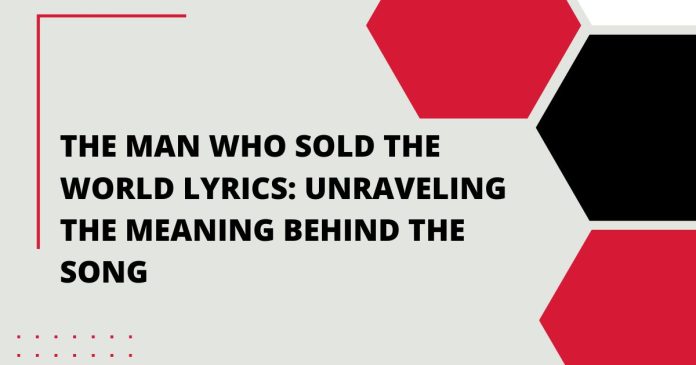Introduction
In the realm of music, certain songs possess an enigmatic quality that leaves listeners captivated and curious about their true meaning. One such composition is “The Man Who Sold the World Lyrics,” a song that has garnered widespread attention for its thought-provoking lyrics and intriguing melody. In this article, we will delve into the essence of this iconic track by exploring its lyrics, deciphering its underlying message, and unraveling its impact on both music enthusiasts and popular culture.
The Artist: David Bowie
Before delving into the depths of the song’s lyrics, it’s essential to acknowledge the creative genius behind the masterpiece – David Bowie. With his chameleon-like ability to reinvent himself, Bowie was not only a musician but also an artist who blurred the lines between music, fashion, and culture. “The Man Who Sold the World” is one of his most acclaimed compositions, and its lyrics mirror his ability to provoke thought and captivate audiences.
A Journey Through the Lyrics
The Enigmatic Question
The opening lines of the song immediately set the tone for its introspective nature: “We passed upon the stair, we spoke of was and when.” This simple phrase presents a mysterious encounter that leaves listeners pondering the significance of passing by someone on a stairwell.
The Identity Crisis
Bowie’s lyrics delve into the notion of identity in “I laughed and shook his hand, and made my way back home.” This encounter with the man who sold the world prompts the narrator to question his own sense of self, initiating a journey of introspection.
Worlds Collide
As the song progresses, “Oh no, not me. I never lost control.” These words suggest a facade of confidence and stability, but underneath lies a sense of unease. The collision of different worlds and realities underscores the complexity of human emotions and experiences.
The Man Who Sold the World
The titular line, “Who knows? Not me. We never lost control.” serves as the song’s core, portraying the idea of selling one’s own world or identity. This cryptic notion leaves listeners grappling with the concept of personal transformation and the sacrifices it entails.
Searching for Answers
“Where’s your homework?” Bowie’s lyrics pose this question, evoking a sense of urgency to confront oneself. This line exemplifies the song’s ability to use everyday phrases to prompt deeper contemplation about life’s meaning and purpose.
Distorted Reflections
The lyrics “Just a little bit of history repeating” point toward the cyclic nature of human existence. This repetition implies that the challenges faced by the narrator are not unique, echoing the idea that history often shapes our present struggles.
The Unveiling of Truth
Bowie’s poignant words, “I thought you died alone, a long, long time ago” reveal a truth that may have been hidden. This realization underscores the complexity of human connections and the secrets that can lie beneath the surface.
Deciphering the Message
“The Man Who Sold the World” is a lyrical tapestry that weaves together themes of identity, transformation, and introspection. The encounter with the man who seemingly sold his world prompts the narrator to question his own sense of self and the authenticity of his reality. Bowie’s masterful use of paradoxes and cryptic phrases invites listeners to reflect on their own lives and experiences.
Impact on Music and Culture
Since its release, “The Man Who Sold the World” has left an indelible mark on both the music industry and popular culture. Its deep and thought-provoking lyrics have inspired countless interpretations and discussions, fostering a sense of community among Bowie’s fans. The song’s influence can be seen in subsequent generations of musicians who draw inspiration from its enigmatic themes and innovative sound.
Conclusion
“The Man Who Sold the World” is a lyrical enigma that continues to intrigue and captivate audiences worldwide. David Bowie’s profound lyrics explore the complexities of identity, transformation, and human connection, inviting listeners to embark on their own journeys of introspection. This song stands as a testament to the power of music to transcend time and space, leaving an enduring legacy that resonates with each new generation.
FAQs
- Who wrote “The Man Who Sold the World” lyrics? The lyrics were written by the legendary musician David Bowie himself.
- What inspired Bowie to write this song? While the exact inspiration is not singular, the song is known to reflect Bowie’s fascination with identity and transformation.
- Are there any notable cover versions of this song? Yes, Nirvana’s cover of “The Man Who Sold the World” introduced the song to a new generation of listeners.
- What album features this iconic song? The song is the title track of David Bowie’s 1970 album, “The Man Who Sold the World.”
- How has the song’s meaning evolved over time? Interpretations vary, but the song’s themes of identity and transformation remain central in discussions about its meaning.

